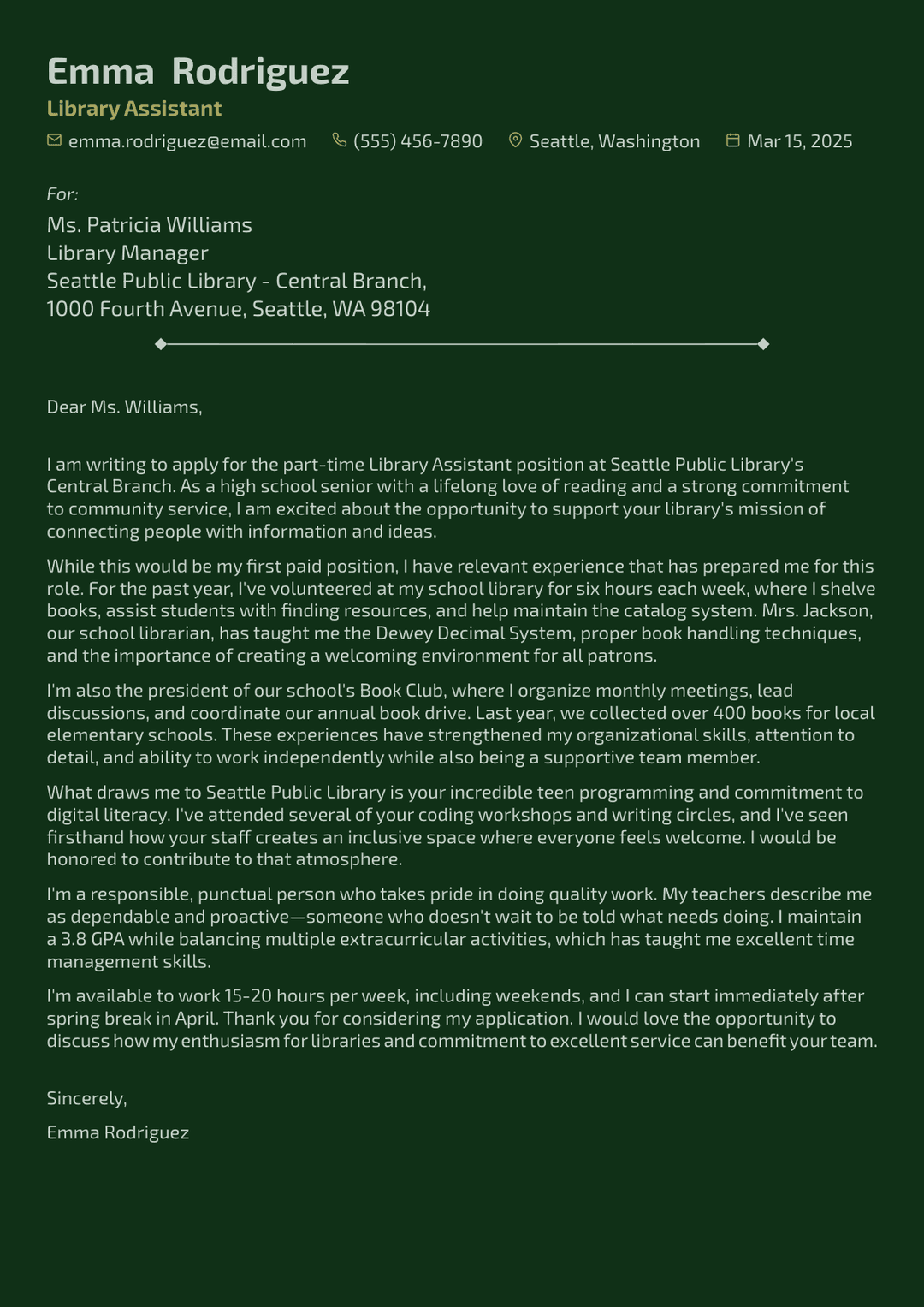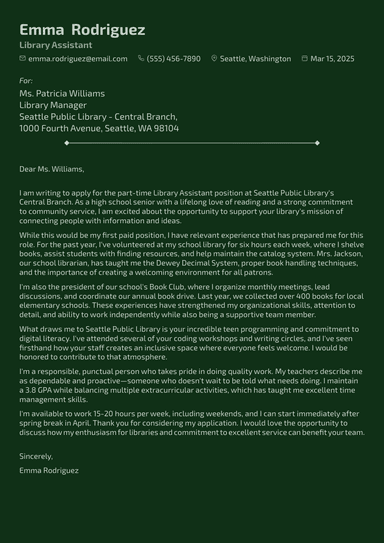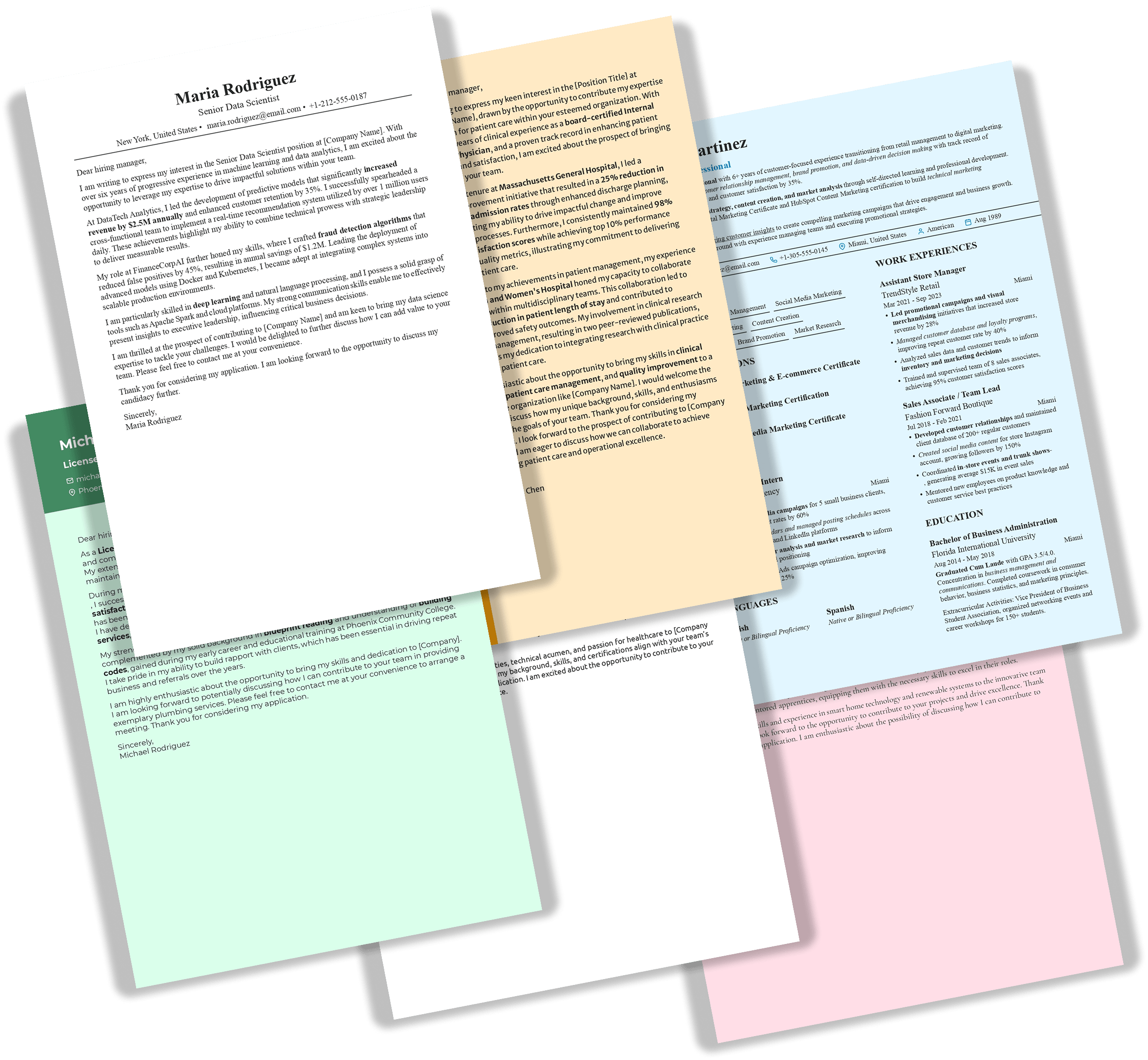Cover Letter With No Experience: Writing Guide + Examples
This complete guide with expert tips and real examples will teach you how to write a compelling cover letter — fast and stress-free!
Edit this cover letter
You're staring at a blank page, wondering how to write a cover letter with no experience, when every job posting seems to demand years of relevant background. Even though most entry-level positions receive applications from candidates who do have some form of experience, whether through internships, part-time work, or volunteer activities, hiring managers aren’t just looking for experience. They're searching for potential, enthusiasm, and cultural fit.
A well-crafted cover letter with no experience can actually outperform one from an experienced candidate. In this guide, we’ll show you exactly how to achieve this, teaching you how to transform your perceived weakness into a compelling narrative that gets you noticed.
- Cover letters for entry-level positions focus on potential rather than experience, allowing you to highlight what you can contribute instead of dwelling on what you lack.
- Transferable skills from education, volunteering, part-time jobs, and life experiences are valuable assets that employers actively seek in new hires.
- Enthusiasm and cultural fit matter as much as experience, especially for companies willing to invest in training the right candidate.
- Proper formatting and personalization are crucial for passing applicant tracking systems and making a professional first impression.
What Makes a Strong Cover Letter With No Experience?
Writing a strong cover letter with no experience requires a fundamental shift in approach compared to standard cover letters. Instead of showcasing years of accomplishments, you're highlighting potential and demonstrating why investing in your future makes sense for the employer.
The key is in storytelling. Experienced professionals can rely on concrete achievements and measurable results. When you don't have that luxury, your cover letter needs to paint a picture of who you could become rather than who you've been, similar to a motivation letter. This means focusing on learning agility, transferable skills, and genuine enthusiasm for the role and company.
As an entry-level candidate, you need to understand that employers hiring for these positions expect to provide training. What they're really evaluating is whether you have the foundation to build upon and the drive to succeed. Your no-experience resume might emphasize your skills over work experience, but your cover letter should tell the story that connects those skills to the role.
Which Elements to Include?
There are several elements your cover letter with no experience should include to establish your professional identity, even without extensive work history, such as:
- Brief statement. This is the starting point that captures your current status (recent graduate, career changer, etc.) and your professional aspirations. It helps contextualize your application immediately.
- Relevant coursework and academic achievements. These deserve significant attention; however, don't just list classes. Explain how specific projects, research, or assignments have prepared you for real-world applications.
- Volunteer work and internships. All of these demonstrate initiative and work ethic. They often provide surprisingly relevant skills, such as project management, stakeholder communication, and deadline management—all transferable to professional environments.
- Part-time jobs. Seemingly irrelevant, they're goldmines for transferable skills. Retail work teaches customer service, problem-solving, and working under pressure. Food service develops multitasking abilities and grace under fire. Even babysitting demonstrates responsibility, crisis management, and communication skills.
Most importantly, your enthusiasm for the role and company should permeate every paragraph. This shows you're applying strategically, not just sending out mass applications.
Cover Letter Examples With No Experience
As already mentioned, a cover letter without professional experience requires emphasizing your education, skills, and potential. Use these two cover letter examples to inspire your own writing.
Recent Graduate Cover Letter
High School Student Cover Letter
How to Write a Cover Letter With No Experience in 7 Steps
Writing a cover letter with no experience can be challenging, but by focusing on your education, transferable abilities, and genuine enthusiasm, you can demonstrate your potential value to employers.
Follow these seven strategic steps to craft a persuasive cover letter that opens doors.
#1. Research the Company and Role
Before you start writing, you need to research the company and the role. Start with their website, but dig deeper into their recent news, social media presence, and industry positioning. Look for connections between your background and their current challenges or goals. If they're expanding into new markets, highlight any relevant language skills or cultural knowledge you possess.
As for the job description, identify both obvious requirements and subtle preferences hidden in the language. Words like "collaborative," "innovative," or "detail-oriented" give you clues about the company culture and what they value in candidates. Use similar language in your cover letter to demonstrate alignment.
Also, research the hiring manager if possible. LinkedIn can provide insights into their background and interests. While you shouldn't get overly personal, finding common ground (shared alma mater, similar career path, etc.) can help establish rapport.
#2. Structure the Header Properly
Even without work experience, presenting your information professionally sets the right tone from the start. Your cover letter header should include your:
- Full name
- Phone number
- Email address
- Location (city and state are sufficient)
Below your contact details, add the date, followed by the employer's information:
- Hiring manager's name (if available)
- Title
- Company name
- Company address
If you don't know the hiring manager's name, try researching the company website or LinkedIn. Addressing your letter to a specific person demonstrates initiative and attention to detail—qualities that matter when you're competing without experience on your side.
Here’s a good example of a cover letter header:
Marcus Thompson
marcus.thompson@email.com
(555) 987-6543
Austin, Texas
March 15, 2025
Mr. David Rodriguez
Hiring Manager
TechSupport Solutions
4500 South Congress Avenue
Austin, TX 78745
As for formatting and fonts, use Arial, Calibri, or Times New Roman in 10-12 point size, and maintain consistent spacing throughout. This professional presentation helps establish credibility before a hiring manager even reads your opening paragraph.
#3. Craft a Compelling Opening
Your opening paragraph needs to accomplish three things:
- Identify the position you're applying for
- Grab the reader's attention
- Establish your value proposition.
Avoid generic openings like "I am writing to express my interest..." Instead, lead with a relevant achievement or insight:
As a recent graduate who increased student organization membership by 40% through targeted outreach campaigns, I'm excited to apply those relationship-building skills to the Marketing Coordinator position at [Company Name].
The key is making your opening specific to the role and company. Mass-produced openings are obvious and immediately detract from your candidacy.
#4. Highlight Your Education and Relevant Coursework
Education is your primary credential when work experience is limited. However, simply stating your degree and GPA isn't enough. You need to connect your academic experience to professional applications. Focus on projects, research, or coursework that directly relates to the position.
Describe specific assignments that mirror real-world responsibilities. For instance, if you're applying for a marketing position, highlight campaigns you created for class or case studies you analyzed.
Academic achievements beyond grades matter too. Dean's list recognition, relevant honors societies, or academic competitions demonstrate excellence and drive. Leadership roles in student organizations show initiative and people management skills that transfer directly to professional environments.
Don't forget about continuing education. Online certifications, workshops, or self-directed learning demonstrate initiative and commitment to professional development.
#5. Showcase Transferable Skills
Transferable skills are your secret weapon when writing a cover letter with no experience. According to a survey, almost two-thirds of employers use skill-based practices for entry-level positions. However, the challenge for you might be identifying and articulating these connections clearly.
For example, communication skills developed through presentations, group projects, or customer service roles are universally valuable. Also, problem-solving abilities demonstrated through overcoming academic challenges, organizing events, or resolving conflicts show analytical thinking and resourcefulness.
Furthermore, leading study groups, mentoring younger students, or coordinating volunteer activities all demonstrate your leadership skills. Additionally, technical skills gained through coursework, personal projects, or hobbies can be decisive factors for entry-level positions.
The key is being specific about how you developed these skills and how they apply to the target role. Instead of claiming you're "detail-oriented," describe a situation where attention to detail prevented a significant error or improved an outcome.
#6. Demonstrate Company Knowledge and Enthusiasm
Enthusiasm based on research shows genuine interest. Reference recent company news, awards, or initiatives, and explain why their approach to business appeals to you professionally or personally.
Connect your values with theirs. If they emphasize innovation, discuss how you've approached problems creatively. If they prioritize community involvement, as with your resume, highlight volunteer work or service learning experiences. This alignment suggests you'll thrive in their culture.
Avoid obvious statements like "I admire your company's success." Instead, demonstrate understanding of what drives that success:
Your company's focus on user-centered design thinking aligns with my belief that the best solutions come from a deep understanding of customer needs, which I developed through my UX design coursework and user research projects.
Show how you could contribute to their future success, not just benefit from it. Even without experience, you can offer fresh perspectives, current knowledge from your recent education, or insights from your generation's viewpoint.
#7. Close with a Strong Call to Action
Your closing paragraph should reinforce your enthusiasm while proposing next steps. Avoid passive language like "I hope to hear from you." Instead, take a more proactive approach:
I'm excited to discuss how my analytical skills and fresh perspective could contribute to [Company Name]'s continued growth. I'll follow up next week to see if we can schedule a conversation.
Express gratitude for their consideration, but keep it brief. A simple "Thank you for considering my application" suffices. End with a professional sign-off like "Sincerely" or "Best regards," followed by your typed name. If you're submitting a hard copy, leave space for your handwritten signature.
Also, consider adding a brief postscript (P.S.) if you have a particularly relevant point that didn't fit naturally elsewhere. This can be an effective way to add a memorable final touch, but use it only when it adds real value.
How to Make Your Cover Letter Stand Out?
Use the STAR method to transform ordinary experiences into compelling narratives. This structured storytelling demonstrates your capabilities in action rather than simply listing qualifications. Instead of writing "I have social media experience," tell a story.
Here’s a good example of how to do it:
When our student organization's Instagram engagement dropped (Situation), I was tasked with revitalizing our online presence (Task). I created a content calendar, posted consistently three times weekly, and engaged authentically with followers (Action). Within four months, we grew from 200 to 800 followers and increased engagement rates by 45% (Result).
Also, quantify achievements whenever possible and connect your personal values to the company mission, creating emotional resonance beyond technical qualifications.
3+ Common Mistakes to Avoid in Your Cover Letter With No Experience
Entry-level candidates often sabotage their applications with avoidable, yet common cover letter mistakes. Recognizing these errors helps you craft a stronger, more confident letter that positions you as a capable candidate rather than an apologetic beginner. Let’s identify which mistakes to avoid:
- Apologizing for lack of experience. Never open with phrases like "Although I don't have much experience..." or "I know I'm not qualified, but..." These statements immediately undermine your candidacy. Focus on your strengths, transferable skills, and potential instead.
- Using the same letter for multiple applications. Mass-produced cover letters are instantly recognizable and suggest disinterest. Even when starting with a template, customize every paragraph to reflect the specific role, company values, and industry.
- Focusing on what you lack. Dwelling on missing qualifications misses the point entirely. Instead, emphasize the unique perspective, current knowledge, and fresh energy you bring. Recent graduates offer up-to-date academic training, while career changers provide cross-industry insights and proven adaptability.
- Poor formatting and typos. Inconsistent fonts, improper spacing, or grammatical errors signal carelessness. Always proofread carefully, use spell-check, and have someone review your letter. Maintain consistent formatting between your cover letter and resume for a polished, professional presentation.
Create Your Perfect Cover Letter With ResumeBuilder.so
Writing a compelling cover letter with no experience doesn't have to be a solitary struggle filled with uncertainty and self-doubt. ResumeBuilder.so’s smart cover letter builder handles the formatting complexities, allowing you to focus on the content. Also, the platform offers AI-powered guidance that helps you showcase your potential.
Each of our templates is optimized for ATS compatibility and follows current professional standards, ensuring your letter looks polished and professional. Therefore, with ResumeBuilder.so’s real-time writing assistance and formatting guidance, you can create a cover letter that complements your resume perfectly.
Final Thoughts
Writing a cover letter with no experience isn't about what you lack. It's about presenting what you offer. Every successful professional started somewhere, and employers who hire entry-level candidates understand they're investing in potential rather than proven track records. Your cover letter serves this purpose, demonstrating your potential and emphasizing why you're worth that investment.
Remember that authenticity outweighs perfection. Take the time to research, customize, and craft each application thoughtfully. This extra effort not only improves your chances but also helps you identify opportunities that truly align with your goals and values.
Cover Letter with No Experience FAQ
#1. What should I include in a cover letter if I have no work experience?
Focus on education, volunteer work, internships, relevant coursework, transferable skills from part-time jobs, and personal projects that demonstrate your capabilities. Highlight academic achievements, leadership roles, and any activities that show initiative and responsibility.
#2. How long should a cover letter be with no experience?
Keep it to one page, approximately 3-4 paragraphs totaling 250-400 words. Concise and focused content is more effective than lengthy explanations that might lose the reader's attention.
#3. Should I mention my lack of experience in my cover letter?
Never apologize for lack of experience. Instead, focus on your enthusiasm to learn, relevant skills, and what you can contribute to the role. Frame your situation positively by emphasizing potential and transferable abilities.
#4. Can I use a cover letter template with no experience?
Yes, templates provide excellent structure and professional formatting, but always customize the content to match the specific job and company you're applying to. Generic applications are easily spotted and often rejected.
#5. How do I show enthusiasm without sounding desperate?
Be specific about why you're interested in the company and role. Research-backed enthusiasm that references company values, recent developments, or industry positioning appears genuine rather than desperate or generic.
#6. What transferable skills should I highlight?
Communication, teamwork, problem-solving, time management, leadership, and technical skills gained from school, volunteer work, or part-time jobs. Also include organization, adaptability, customer service, and project management abilities demonstrated through various experiences.
#7. How can I make my cover letter stand out without experience?
Tell compelling stories about your achievements, quantify results where possible, show genuine company knowledge, connect your values with theirs, and demonstrate how your fresh perspective could benefit their organization.
#8. Should I address employment gaps in my cover letter?
You should address employment gaps only if they're significant and relevant to your story. Brief gaps for education, family responsibilities, or career exploration don't require explanation. If addressing gaps, frame them positively around growth, learning, or purposeful preparation.
#9. What's the best way to research a company for my cover letter?
Review their website, recent news articles, social media presence, industry reports, and employee reviews. Look for company culture insights, recent achievements, challenges, and future goals to reference appropriately in your letter.
#10. How soon should I follow up after sending my cover letter?
Wait 1-2 weeks after the application deadline or submission date before following up. Send a brief, professional email reiterating your interest and asking about the timeline for next steps in the hiring process.


